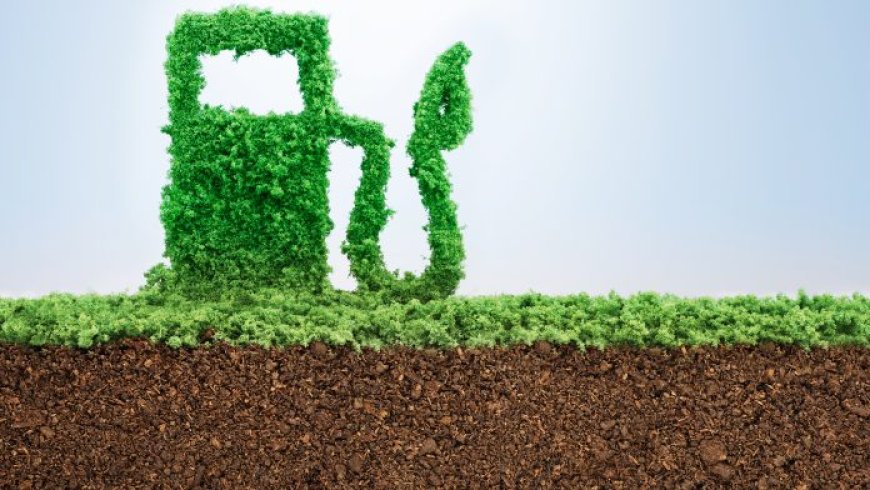Navigating the Future: The Promise of Sustainable Fuels
In a world grappling with the consequences of climate change and the looming energy crisis, the quest for sustainable solutions has never been more pressing. One area that holds immense promise is the development and adoption of sustainable fuels. As traditional fossil fuels continue to contribute to environmental degradation, the imperative to transition towards cleaner, renewable alternatives has gained widespread recognition. In this comprehensive exploration, we delve into the realm of sustainable fuels, examining their potential, current advancements, and the role they play in shaping a more environmentally conscious future.

Navigating the Future: The Promise of Sustainable Fuels
TABLE OF CONTENT:-
Introduction
Understanding Sustainable Fuels
Types of Sustainable Fuels
The Environmental Benefits of Sustainable Fuels
Current Advancements and Innovations
Challenges and Barriers
The Role of Government Policies
Global Initiatives and Collaborations
Conclusion: Charting a Course for a Sustainable Future
Introduction
In a world grappling with the consequences of climate change and the looming energy crisis, the quest for sustainable solutions has never been more pressing. One area that holds immense promise is the development and adoption of sustainable fuels. As traditional fossil fuels continue to contribute to environmental degradation, the imperative to transition towards cleaner, renewable alternatives has gained widespread recognition. In this comprehensive exploration, we delve into the realm of sustainable fuels, examining their potential, current advancements, and the role they play in shaping a more environmentally conscious future.
Understanding Sustainable Fuels
Sustainable fuels, often referred to as biofuels or renewable fuels, are energy sources derived from organic materials or waste streams that can be replenished naturally. Unlike conventional fossil fuels such as coal, oil, and natural gas, sustainable fuels aim to minimize environmental impact by harnessing energy from renewable resources. These resources include biomass, agricultural residues, algae, and even waste products like municipal solid waste.
The urgency to transition to sustainable fuels stems from the environmental challenges posed by traditional fossil fuels, including air pollution, greenhouse gas emissions, and the depletion of finite resources. The key advantage of sustainable fuels lies in their potential to reduce carbon emissions and mitigate the adverse effects of climate change while offering a viable alternative to conventional energy sources.
Types of Sustainable Fuels
Biofuels:
Bioethanol: Derived from fermented sugars in crops like sugarcane and corn, bioethanol is a widely used sustainable fuel in the transportation sector.
Biodiesel: Produced from plant oils, animal fats, or recycled cooking oil, biodiesel serves as an eco-friendly substitute for traditional diesel.
Hydrogen:
Green Hydrogen: Produced through the electrolysis of water using renewable energy sources, green hydrogen is a clean alternative with applications in various industries, including transportation and energy storage.
Advanced Biofuels:
Cellulosic Ethanol: Extracted from non-food sources like agricultural residues, wood, and grasses, cellulosic ethanol represents a more advanced and sustainable form of biofuel.
Algal Biofuel: Cultivated from algae, this biofuel offers high energy yields and can be produced in environments unsuitable for traditional agriculture.
Synthetic Fuels:
Synthetic Gasoline and Diesel: Produced through the chemical conversion of renewable electricity, carbon dioxide, and hydrogen, synthetic fuels mimic traditional fossil fuels without the associated environmental drawbacks.
The Environmental Benefits of Sustainable Fuels
Reduced Greenhouse Gas Emissions:
Sustainable fuels, particularly biofuels, have the potential to significantly reduce greenhouse gas emissions. The carbon dioxide released during combustion is offset by the carbon absorbed during the growth of the organic materials used in their production.
Air Quality Improvement:
Unlike conventional fossil fuels that release pollutants such as sulfur and nitrogen oxides, sustainable fuels burn more cleanly, contributing to improved air quality and reduced respiratory issues.
Preservation of Biodiversity:
Sustainable fuel production often utilizes non-food crops or waste materials, minimizing the impact on agricultural land and avoiding competition with food production. This approach helps preserve biodiversity and protect ecosystems.
Energy Security:
The reliance on renewable resources for sustainable fuel production enhances energy security by reducing dependence on finite fossil fuel reserves, which are often subject to geopolitical uncertainties.
Current Advancements and Innovations
Advanced Technologies in Biofuel Production:
Genetic Engineering: Advancements in genetic engineering have enabled the development of crops with enhanced energy content, resilience, and suitability for biofuel production.
Biological and Chemical Catalysts: Innovative catalysts are being explored to streamline the conversion of organic materials into biofuels, improving efficiency and reducing production costs.
Green Hydrogen Production:
Electrolysis Advancements: Ongoing research in electrolysis techniques aims to enhance the efficiency and cost-effectiveness of green hydrogen production, making it a more viable alternative.
Synthetic Fuels Research:
Carbon Capture and Utilization (CCU): Integrated with synthetic fuel production, CCU technologies capture carbon dioxide emissions and convert them into valuable feedstocks for fuel synthesis.
Algal Biofuel Optimization:
Bioreactor Design: Innovations in bioreactor design and cultivation techniques are optimizing the growth of algae for biofuel production, increasing yields and minimizing resource inputs.
Challenges and Barriers
Cost Competitiveness:
The cost of sustainable fuels, particularly in comparison to traditional fossil fuels, remains a significant barrier to widespread adoption. Continued research and technological advancements are crucial to driving down production costs.
Infrastructure Limitations:
The existing infrastructure for traditional fossil fuels poses a challenge in accommodating the storage, distribution, and utilization of sustainable fuels. Infrastructure upgrades and investments are essential for a seamless transition.
Land Use and Resource Competition:
The cultivation of crops for biofuel production may compete with food production and lead to land use conflicts. Sustainable practices, such as using non-food crops or waste materials, can help address this concern.
Technological Maturity:
Some sustainable fuel technologies are still in the early stages of development and lack commercial scalability. Achieving technological maturity is crucial for the widespread implementation of these solutions.
The Role of Government Policies
Government policies play a pivotal role in shaping the landscape for sustainable fuels. Various countries have implemented regulatory frameworks, incentives, and targets to promote the development and use of renewable energy sources. Policy measures include:
Renewable Fuel Standards (RFS):
Mandating a certain percentage of renewable fuels in the overall fuel mix encourages the adoption of sustainable fuels and supports market growth.
Subsidies and Incentives:
Financial incentives, tax credits, and subsidies for sustainable fuel production and consumption provide crucial support for overcoming cost barriers and fostering market competitiveness.
Research and Development Funding:
Governments can stimulate innovation and technological advancements by allocating funding for research and development in the sustainable fuels sector.
Carbon Pricing:
Implementing carbon pricing mechanisms encourages the adoption of sustainable fuels by assigning a cost to carbon emissions, making cleaner alternatives more economically attractive.
Global Initiatives and Collaborations
On the international stage, collaborative efforts are underway to address climate change and promote sustainable development. Initiatives such as the Paris Agreement and the Sustainable Development Goals (SDGs) emphasize the need for a transition to cleaner energy sources, including sustainable fuels.
Collaborations between countries, research institutions, and private enterprises are fostering the exchange of knowledge, expertise, and resources. Multinational partnerships are crucial for overcoming common challenges and achieving global sustainability goals.
Conclusion: Charting a Course for a Sustainable Future
In conclusion, sustainable fuels represent a beacon of hope in the quest for a cleaner, more sustainable future. The diverse array of biofuels, hydrogen, and synthetic fuels offer a comprehensive toolkit for addressing the environmental challenges associated with conventional fossil fuels. While challenges persist, ongoing advancements in technology, supportive government policies, and global collaborations provide a roadmap for overcoming hurdles.
As we navigate the future, it is imperative to continue investing in research and development, promote innovative solutions, and create an enabling environment for the widespread adoption of sustainable fuels. By doing so, we not only mitigate the environmental impact of our energy consumption but also lay the foundation for a more resilient and sustainable global energy landscape. The promise of sustainable fuels is not just a technological advancement but a commitment to preserving our planet for generations to come.




